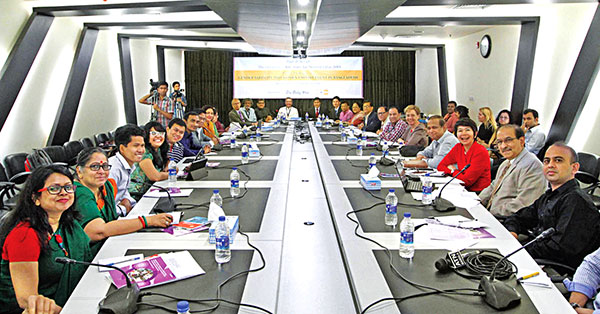Published in The Daily Star on Tuesday, 3 March 2015.
New policies must address violence against women
Daily Star-UNFPA roundtable told
Staff Correspondent

Violence against women and child marriages, which have remained challenges for the country, should be addressed in the upcoming international, regional and national level policies, noted discussants at a roundtable yesterday.
Representatives from the government, NGOs and development organisations shared their views on women-related issues at the “Policy Dialogue on Gender Equality and Women Empowerment” organised on the occasion of International Women’s Day by The Daily Star and UNFPA at The Daily Star Centre in the capital.
They said despite Bangladesh’s achievements in areas of health, education and employment and formation of a number of women friendly laws and policies, social change required to improve women’s lives did not occur.
“You can’t have physical violence against two-thirds of the population if they are valued,” said Christine Hunter, representative from UN Women, referring to statistics of violence against women in the country.
Citing examples of what the country lacks in preventing violence against women, including laws to cover the rights of domestic workers and marital rape, Hunter said policies, systems and practices enabling women to fully exercise their opportunity and rights in the context of Bangladesh should be looked into.
Mahfuz Anam, editor and publisher of The Daily Star, said, “In the 21st century the discrimination between one human being and another is very shameful.”
He emphasised the importance of gender equality for creating a democratic and developed nation.
Ayesha Khanam, president of Bangladesh Mahila Parishad, said housing, transport and child care are huge challenges for professional women.
Toufiq Khan, gender specialist from the Centre for Policy Dialogue, said although the percentage of women in the labour market in the last 20 years increased from four percent to 36 in 2010, a recent CPD survey showed that only 25 percent of the currently unemployed women want to join the labour force.
“About 60 percent of the women said their family will not like it (joining workforce),” he said, adding that many women cited lack of suitable work as the reason for not working.
“Health indicators are not actually empowerment indicators,” said Ubaidur Rob, country representative of Population Council.
Advocate Salma Ali, president of Bangladesh National Woman Lawyers Association, called for ensuring accountability and gender-sensitisation of law enforcement agencies.
On a positive note, Dr Shamsul Alam, senior secretary, General Economic Division of the Planning Commission, said Bangladesh ranked better than other South Asian countries on the Global Gender Gap Index 2014.
“Out of 142 countries, Bangladesh ranked 68 in reducing gender gap,” he said, adding that Bangladesh outranked Sri Lanka, Nepal, India and Pakistan.
Ambassador of the Netherlands in Dhaka Gerben de Jong spoke about a pilot project run by the Netherlands in Bangladesh.
Swedish Ambassador Johan Frisell said his country in consultation with the Bangladesh government would like to facilitate women’s participation in the labour market.
Iori Kato, officer-in-charge of UNFPA, concluded the discussion saying, “If you like to change the future, now is the time.”

